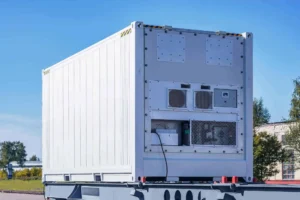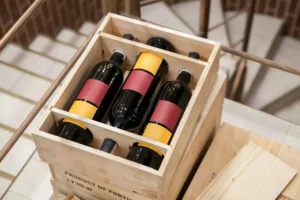While GrtWines takes great care in storing and preserving your physical wine bottles, the journey of a wine to the buyer’s cellar is equally important. Proper shipping is essential to maintain the quality and integrity of the wine, while also considering its environmental impact. The process of shipping wine can be complex and challenging, requiring specialized knowledge and equipment to ensure that the precious cargo arrives at its destination in the same pristine condition it left the chateau.
In this article, we will delve into the challenges of shipping wine, explore cost-effective solutions, and highlight the importance of partnering with reputable shipping companies to guarantee the safe delivery of your wines. We’ll also touch on emerging practices in the industry that aim to make wine logistics more sustainable, addressing the growing environmental concerns in the world of wine.
Table of Contents
Toggle
The Challenges of Wine Shipping
Wine shipping presents a unique set of challenges that differs from shipping everyday products. This includes temperature control, legal regulations, and more. Read on below for the main things to be aware of when shipping your wines:
Temperature control

Maintaining a stable temperature throughout the shipping process is the most critical factor in ensuring your wine makes it to its destination in the same condition in which it left the chateau. When your wine is exposed to extreme temperatures, it can dramatically affect its taste and how it ages. We discuss this topic in greater detail on our post on wine storage which you can check out below:
Wine Storage 101: Key Elements for Preservation
Handling Fragile Cargo
When it comes to shipping wine, it’s important to remember that wine bottles are incredibly fragile. These delicate containers can easily shatter if they’re not handled with care during the shipping process. Even the slightest bump or vibration can cause a bottle to crack or break, leading to the loss of your precious wine. And it’s not just about losing a single bottle – if one bottle breaks, it can potentially damage other bottles in the same shipment, compounding the loss.
Legal regulations and restrictions
Shipping wine across state lines or internationally is subject to a complex web of legal regulations and restrictions. In the United States, this can be even more difficult as each state has its own laws governing the shipment of alcohol, which can vary widely. Some states prohibit direct-to-consumer shipping altogether, while others have strict limits on the quantity of wine that can be shipped or the types of wine that can be imported.
Internationally, wine shipping is subject to customs regulations, taxes, and duties, which can add significant costs and delays to the shipping process. Navigating these legal complexities requires expertise and experience to ensure compliance and avoid potential pitfalls. Check out the link below for a list of different regulations around the world for shipping wine provided by FedEx:
International Wine Shipping Country Documentation Requirement
Professional Wine Shipping: Ensuring Quality and Value
When it comes to shipping wine, partnering with a professional shipping company can ensure your wines reach their destination safely and in perfect condition. These companies specialize in the unique challenges of wine transportation and offer several key benefits:
Temperature-controlled transportation
Professional wine shipping companies use state-of-the-art temperature-controlled vehicles and containers to maintain the optimal temperature range (55°F to 65°F) for wine during shipping, preserving its quality and flavor profile.
Expertise in handling and packaging
These companies have the expertise to handle and package wine properly, using high-quality protective materials and trained staff to minimize the risk of breakage during transit.

Knowledge of legal regulations and compliance
Professional logistics companies navigate the complex web of legal regulations surrounding wine shipping, ensuring compliance and avoiding potential legal issues or unexpected fees.
Insurance and liability coverage
To protect your investment, these companies offer comprehensive insurance and liability coverage. While terms may vary, this coverage provides peace of mind in case of damage or loss during shipping.
By partnering with a professional shipping company, you can ensure the safe delivery of your wine while maintaining its quality and value.
Cost-Effective Wine Shipping Solutions
While ensuring the safe and secure delivery of your wine is the top priority, it’s also important to consider the cost of shipping. Shipping can be expensive, especially when shipping individual bottles or small quantities. However, there are several cost-effective solutions that can help you save money without compromising on quality. Many of these solutions can also help to minimize the environmental impact of shipping your wines.
Shipping wine in bulk
One of the most cost-effective ways to ship wine is by shipping in bulk, typically by the case. When you ship wine by the case, you can take advantage of lower per-bottle shipping rates, as the cost of packaging and handling is spread across multiple bottles. Additionally, shipping wine in bulk reduces the risk of damage, as the bottles are more securely packed and have less room to move around during transit.
Comparison of shipping costs for single bottles vs. cases
To illustrate the cost savings of shipping wine in bulk, let’s compare the shipping costs for single bottles versus cases. Shipping a single bottle of wine can cost anywhere from $20 to $100, depending on the size of the bottle and the distance it needs to travel.
In contrast, shipping a case of wine (typically 12 bottles) can cost anywhere from $30 to $150, which works out to a per-bottle shipping cost of $2.50 to $12.50. As you can see, shipping by the case can result in significant cost savings compared to shipping individual bottles.
Consolidating wine shipments
Consolidating shipments is another cost-effective strategy for wine collectors. By coordinating purchases from multiple sources and arranging to have them shipped together, you can significantly reduce overall shipping costs. Shipping companies often charge a base fee per shipment, so combining multiple purchases into a single shipment spreads this fee across more bottles, lowering the per-bottle cost.

To maximize this strategy, plan ahead and communicate with your sources. Ask about their policies for holding purchases and combining orders. Many wineries or retailers, like GrtWines, offer options to hold your purchases for a period, allowing you to consolidate them with other orders before shipping.
Professional Wine Logistics: Temperature-Controlled Wine Shipping Companies
When it comes to shipping wine, partnering with a reputable logistics provider is essential. Below we’ve listed a few of the more prominent companies providing temperature controlled shipping services that can help to ensure your wines get from point A to B while maintaining their value and quality:
- Hillebrand: With over 175 years of experience, Hillebrand offers a range of services, including temperature-controlled transportation, warehousing, and distribution, as well as customs clearance and compliance support.
- Western Carriers: This specialized transportation company focuses on shipping wine and other alcoholic beverages, offering temperature-controlled transportation, warehousing, and distribution services, as well as customized shipping solutions.
- Appellation Transport: Specializing in temperature-controlled transportation for wineries, distributors, and collectors, Appellation Transport also offers warehousing and fulfillment services.
- Xpeditr: This global logistics company offers specialized services for the wine and spirits industry, with a network of temperature-controlled warehouses and transportation providers, as well as advanced technology for tracking and monitoring shipments.
Sustainability in the Wine Shipping Industry
As the world becomes increasingly aware of the need for environmental sustainability, the wine shipping industry is taking steps to reduce its carbon footprint and adopt more eco-friendly practices.
Temperature-controlled shipping, essential for maintaining wine quality, requires specialized containers and vehicles with built-in refrigeration systems. These consume more energy than standard shipping methods, increasing greenhouse gas emissions. This impact is amplified when wine is shipped long distances across continents.
Packaging also contributes to the environmental footprint. Wine bottles, typically made of heavy, fragile glass, require sturdy packaging to prevent breakage. This often results in using more packaging materials compared to other products, further impacting the environment through production and disposal.
However, the industry is taking steps to mitigate these impacts. Innovations include exploring alternative packaging options like lightweight bottles and eco-friendly materials, as well as consolidating shipments and optimizing routes to reduce fuel consumption and emissions. These efforts demonstrate the wine industry’s growing commitment to sustainability in logistics.

How GrtWines contributes to sustainability in the wine industry
At GrtWines, we are committed to promoting sustainability in the wine industry. By allowing collectors and traders to build out their cellars without actually taking delivery of the wines, we help reduce the number of trips that bottles need to take, thereby decreasing fuel consumption and emissions. Collectors can store their wines in our secure, temperature-controlled facilities until they are ready to take delivery, at which point they can consolidate their wines into a single shipment.
The GrtWines marketplace also enables collectors to trade their wines on the secondary market without the need for additional shipping. This not only reduces the environmental impact of wine transportation but also allows collectors to manage their cellars more efficiently and sustainably.
Wrap Up
Proper wine shipping is essential to protect the quality and value of your investment. From temperature control and professional handling to navigating legal regulations and considering cost-effective solutions, there are many factors to consider when shipping wine. By partnering with reputable shipping companies and utilizing cost-effective strategies such as bulk shipping, you can mitigate risks, reduce costs, and ensure that your wine arrives in pristine condition.
At GrtWines, we’re committed to promoting sustainability in the wine industry. Our unique approach to wine collecting and trading allows enthusiasts to build their dream cellars and trade on the secondary market, all without the need for multiple shipments. By storing wines securely in our temperature-controlled facilities until delivery, we minimize the carbon footprint associated with traditional wine trading while ensuring optimal conditions for your collection.



